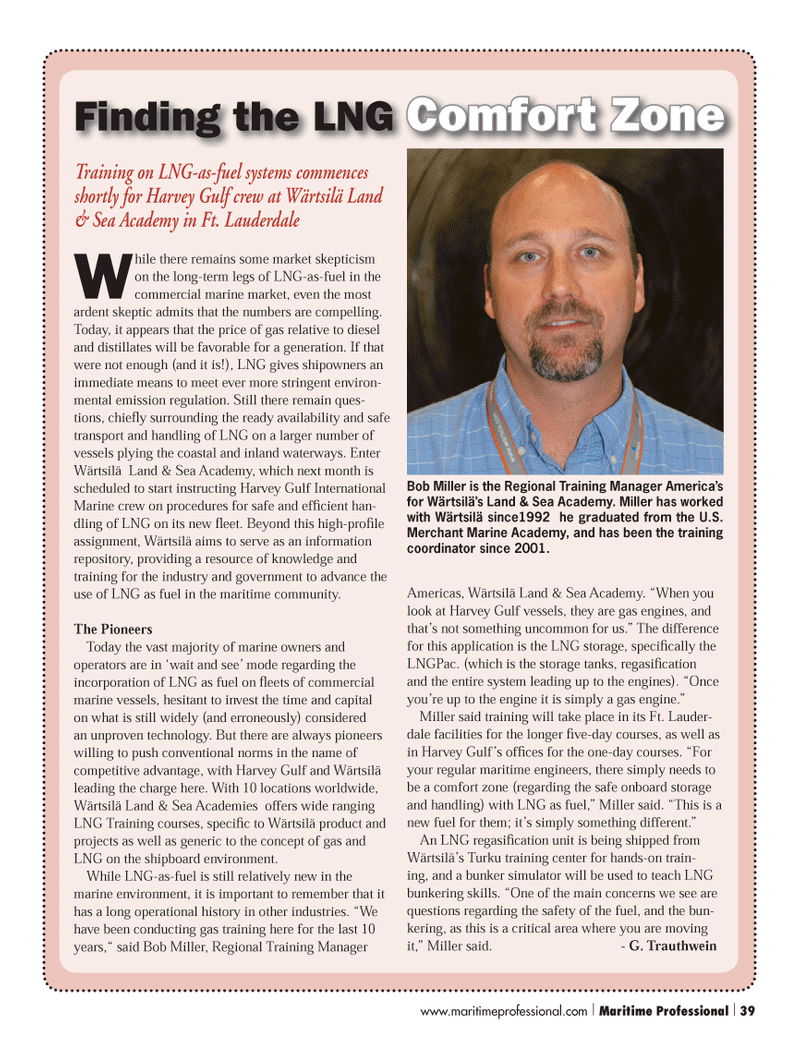
Page 39: of Maritime Logistics Professional Magazine (Q3 2013)
Training & Security
Read this page in Pdf, Flash or Html5 edition of Q3 2013 Maritime Logistics Professional Magazine
Finding the LNG Comfort Zone Comfort Zone While there remains some market skepticism on the long-term legs of LNG-as-fuel in the commercial marine market, even the most ardent skeptic admits that the numbers are compelling. Today, it appears that the price of gas relative to diesel and distillates will be favorable for a generation. If that were not enough (and it is!), LNG gives shipowners an immediate means to meet ever more stringent environ- mental emission regulation. Still there remain ques- tions, chieß y surrounding the ready availability and safe transport and handling of LNG on a larger number of vessels plying the coastal and inland waterways. Enter W?rtsil? Land & Sea Academy, which next month is scheduled to start instructing Harvey Gulf International Marine crew on procedures for safe and efÞ cient han- dling of LNG on its new ß eet. Beyond this high-proÞ le assignment, W?rtsil? aims to serve as an information repository, providing a resource of knowledge and training for the industry and government to advance the use of LNG as fuel in the maritime community. The PioneersToday the vast majority of marine owners and operators are in Ôwait and seeÕ mode regarding the incorporation of LNG as fuel on ß eets of commercial marine vessels, hesitant to invest the time and capital on what is still widely (and erroneously) considered an unproven technology. But there are always pioneers willing to push conventional norms in the name of competitive advantage, with Harvey Gulf and W?rtsil? leading the charge here. With 10 locations worldwide, W?rtsil? Land & Sea Academies offers wide ranging LNG Training courses, speciÞ c to W?rtsil? product and projects as well as generic to the concept of gas and LNG on the shipboard environment. While LNG-as-fuel is still relatively new in the marine environment, it is important to remember that it has a long operational history in other industries. ÒWe have been conducting gas training here for the last 10 years,Ò said Bob Miller, Regional Training Manager Americas, W?rtsil? Land & Sea Academy. ÒWhen you look at Harvey Gulf vessels, they are gas engines, and thatÕs not something uncommon for us.Ó The difference for this application is the LNG storage, speciÞ cally the LNGPac. (which is the storage tanks, regasiÞ cation and the entire system leading up to the engines). ÒOnce youÕre up to the engine it is simply a gas engine.Ó Miller said training will take place in its Ft. Lauder- dale facilities for the longer Þ ve-day courses, as well as in Harvey GulfÕs ofÞ ces for the one-day courses. ÒFor your regular maritime engineers, there simply needs to be a comfort zone (regarding the safe onboard storage and handling) with LNG as fuel,Ó Miller said. ÒThis is a new fuel for them; itÕs simply something different.Ó An LNG regasiÞ cation unit is being shipped from W?rtsil?Õs Turku training center for hands-on train- ing, and a bunker simulator will be used to teach LNG bunkering skills. ÒOne of the main concerns we see are questions regarding the safety of the fuel, and the bun- kering, as this is a critical area where you are moving it,Ó Miller said. - G. Trauthwein Bob Miller is the Regional Training Manager America?s for Wärtsilä?s Land & Sea Academy. Miller has worked with Wärtsilä since1992 he graduated from the U.S. Merchant Marine Academy, and has been the training coordinator since 2001. Training on LNG-as-fuel systems commences shortly for Harvey Gulf crew at Wärtsilä Land & Sea Academy in Ft. Lauderdale www.maritimeprofessional.com | Maritime Professional | 39MP #3 34-49.indd 39MP #3 34-49.indd 399/11/2013 12:52:03 PM9/11/2013 12:52:03 PM

 38
38

 40
40
